Image: Major Rinchen receives the Seva Medal from the then Chief of the Army Staff, General J N Chaudhury
Photographs: Courtesy, Claude Arpi
Claude Arpi
Major Chewang Rinchen became the youngest recipient of the Maha Vir Chakra. He not only seized the highest post ever captured, but also liberated an area of 800 sq km from Pak occupied Kashmir, the largest area captured in the 1971 war with hardly any supplies and no artillery support.
Claude Arpi salutes this brave Indian soldier.
Have you heard of Colonel Chewang Rinchen?
In 1948, at the age of 17, Rinchen enrolled in the Indian Army; the same year, he won his first Maha Vir Chakra, becoming the youngest recipient of the prestigious decoration.
Born in 1931, Chewang could have spent his entire life in the remote village of Sumur, at the confluence of the Shyok and Nubra rivers. But the visit of the Kalon (minister) of Ladakh changed the course of his life.
The official spotted the spark in the 13-year boy and after gaining the approval of his parents, decided to take him to the Leh to educate him.
Four years later, in one of the most daring operations of the 1947-1948 War, Captain Prithi Chand and a few of his Lahauli companions saved Leh by reaching the Ladakhi capital before the Pakistani raiders: They had done the impossible, cross the Zojila pass in winter.
The captain soon became the mentor of the young Rinchen, who underwent a short military training under him. Rinchen then recruited 28 of his friends from the Nubra Valley and created the Nubra Volunteer Force. They were to play a crucial role in 1947-1948 War.
In April 1969, Major Chewang Rinchen was finally given a regular commission in the Indian Army and was posted with the 14 J&K Rifles. His battalion was soon transferred to Firozpur in Punjab.
But when the heat of the summer became too unbearable for the young Nunnu (name given to the natives of the Nubra Valley), he applied for a transfer back to the Ladakh Scouts. This was granted.
In August 1971, as the clouds were gathering over the Indo-Pakistan border, Rinchen joined his old regiment; he was sent again to his beloved Nubra Valley
A month later, Rinchen started reorganising the Nubra Guards, giving them a special training in firing small arms. He enrolled 550 young local volunteers and organised them into four companies (called by the names of the nearby ranges Karakoram, Saser, Remo and Saltoro). Their training lasted two weeks from November 1 to 15.
Major General S P Malhotra, the General Officer Commanding of 3 Infantry Division responsible for the defence of Ladakh, then asked Rinchen and Colonel Udai Singh, his commanding officer, if they could look after the Nubra/Shyok sector of the border.
Rinchen confidently told his GOC that the Ladakhi Scouts and the Nubra Guards did not need any additional forces; they would do it.
Situated 140 km north of Leh, the Nubra Valley was linked to the capital of Ladakh via the Khardung La, the highest motorable pass of the planet at 5,602 metres.
The army base for the sector was located at Partapur in the Valley and since 1960 an airfield had been opened at Thoise (still today the base camp for the operations on the Siachen Glacier)
Image: The Nubra Guards
On December 3, 1971, after the Pakistan air force conducted pre-emptive air strikes on Indian air bases, Indira Gandhi declared: 'India stands for peace but if war is thrust upon us, we are prepared to fight.'
The same day, Major Rinchen was ordered by his CO: 'The Ladakhi Scouts and the Nubra Guards should be ready to move west tomorrow morning.' Rinchen had the night to make all the necessary arrangements and distribute the tasks between the different companies.
The Nunnu was a good tactician; for example, he always sought the cooperation of the local people of the valley, whether they were Buddhist, Muslim or Christian. He knew that most of the time, the troops had to depend upon local vegetables, meat and other supplies like sattu, pawai, thukpa (soup) and chang (beer) to survive.
The first day, the troops placed under the command of Major Rinchen (known as the Dhal Force), advanced to a place called Baigdangdo, driving for 40 km in jeeps and finishing the next 40 km by foot.
A first briefing was held: What approach should be taken to attack the Pakistani forces: Via the steep mountainous paths or along the Shyok river?
While all the commanders favoured the river bed-side approach, Rinchen decided to cross over the mountains. He argued that the enemy must be waiting with mines and machine gun nests near the river. He chose to capture Pt 18,402, the highest Pakistan-occupied post and then roll down to Chulunkha, the Pakistani base. He knew the area well, having patrolled it in 1965 and in September 1971.
The 40-year-old major had plenty of unorthodox and unconventional ideas about a battle in high altitude and his superiors had confidence in his ability to lead his men to victory.
He first rejected the steel helmet for balaclavas (monkey caps) and ammunition boots for Ladakhi 'pabos' which were lighter and warmer (and therefore more efficient against frost bites); water bottles were not filled with plain water, but a mixture of rum and water which did not freeze at high altitude.
The beddings were reduced to the minimum as Richen expected 'complementary' blankets from the Pakistani prisoners and as for the ammunitions, the quantity was cut by half, he instructed his men to use grenades and bayonets.
Thus the jawans were 'light-capped, light-footed, light-armed and light-baggaged.'
Image: With the Dalai Lama in Dharamsala
His entire strategy was to take the enemy by surprise and avoid heavy fighting (he was a Buddhist, let us not forget).
The task of capturing Pt 18,402 was assigned to a 400-men column under Major S S Ahluwalia. Though many non-local jawans dropped en route, the Dhal Force advanced slowly towards Pt 18,402.
The capture had eventually to be postponed for a day due to the treacherous terrain and the heavy firing from the post.
Major Ahluwalia was then ordered to silently send one platoon to the back of Pt 18,402 and take control of the Pakistan line of communication; the rest of the troops would continue to keep the enemy engaged.
At one point Rinchen ordered the Nubra Guards at the rear to start shouting: 'Hands-up and surrender, otherwise you will be arrested.' This was a diversion for Major Ahluwalia to finally seize the crucial post. Several Pakistani soldiers were killed while many managed to flee.
When they heard the war cry, 'Ki Ki So So La Gyalo' (Victory to the Gods), the rest of the Indian troops joined Major Ahluwalia and his 18 dare-devil soldiers to celebrate.
On December 8, from the top of Pt 18,402, Rinchen could see the entire valley from Turtok and Chulunkha in the East, to the Indian Army headquarters at Partapur and the airfield at Thoise in the west.
Rinchen was able to get some precious information from the Pakistani POWs about the strength, disposition, arms and ammunitions and approaches to other posts.
He ordered the mortars to fire at the Pakistani administrative post down below to 'soften' the target. Soon the enemy began to panic and run away from their trenches and bunkers.
After one day's rest, the Indian troops began 'rolling down' on the administrative post. When they reached the camp (it took more than 2 hours to 'climb' down 300 metres), the Pakistanis had abandoned this important post.
The Ladakhis and Nunnus recovered a huge stock of food supplies, blankets and ammunition.
Rinchen's tactics had paid. He told his men, 'Enjoy the Pakistani blankets and food.' A bara khana was organised and rum flowed in abundance that night.
On December 9, advancing along the ridges, Rinchen and his men descended towards the Chulunkha defence complex, trying not to be seen by the enemy.
The only way was a nullah. As Rinchen was not comfortable with this approach, he decided to lead the assault himself along with Major Thapa and two platoons of the Nubra Guards. One platoon from each company was kept in reserve.
As the Indian mortars began firing, not a single shot was fired in retaliation. But as they approached, the Pakistanis opened fire with mortars and machine guns. Rinchen's troops faced heavy firing from all sides.
Soon, Rinchen got a wireless message from Thapa informing him that his team had managed to enter the enemy bunkers and a few Pakistani soldiers had been killed and a JCO captured. Rinchen had to join Major Thapa at any cost.
At about 2 am after several unsuccessful attempts, Naik Fateh Mohammad silenced the MMGs (medium machine gun). The Nunnus war-cry was then heard. Using bayonets, the remaining Pakistani troops were quickly overpowered; not a single shot had been fired by the Indian troops.
Image: Major Rinchen addresses the local population
At 6 am, a runner came with the news that some Pakistani soldiers were still hiding in a hole one the top of a bunker, but they wanted to surrender.
Rinchen then told his jawans that they should behave properly with the POWs. Rinchen then addressed the prisoners: 'You are all brave and I appreciate your unbounded courage and absolute loyalty to your country..'
'It was your duty to fight for your country as best as you could and you did so. Now, since you have surrendered, you are our guests and friends.'
The following days (December 11 and 12) was a day for resting, reorganisation and evacuation of casualties.
The next task was to take Turtok on the left bank of the river Syhok.
By that time, the Pakistani troops had established road blocks and prepared to defend Turtok.
On December 14th morning, soon after shelling started to destroy the road blocks near the Turtok axis, the Dhal Force began its advance.
At 10 pm, shelling was stopped and the troops entered the Turtok village. Surprisingly, the village was absolutely silent.
They found out later that the Pakistani soldiers had run away the previous night. Rinchen forced his entry into the largest house to find that only men were still present in the village. Women and children were hiding in a nullah nearby: They were too scared of the Indian troops.
Rinchen began to speak to the village headman and panchayat chairman and reassured him that nothing bad would happen to them. Suddenly a villager recognised him, 'You are from village Sumur and you are the son of Kunzang.'
It was Rinchen's second victory of the day, this time over the hearts of the local population.
When he called for a meeting, about a thousand local people area assembled to hear Major Rinchen who solemnly told them:
1. We welcome you again to the Indian nation after 23 years.
2. The Indian Army will help you in all respects. Bring back your womenfolk and children. They are like our mothers and sisters. I will be responsible for their safety, if there is any misbehaviour on the part of any soldier or civilian who has come with us, I shall take disciplinary action against the person who misbehaves.
3. I want you all to settle down as free citizens of India where people of different religions live and work together in peace and harmony.
Image: A formal portrait of Major Chewang Rinchen
The next phase of the operations was Tyakshi village, 6 km from Turtok. It was concluded on December 14 in the evening. A few Pakistani soldiers were captured with arms and ammunition.
The next day, Rinchen decided to proceed to Tyakshi and Pachethang. By that time the enemy had stopped offering resistance as they had already withdrawn towards Prahnu and Dothang villages in Baltistan.
The surrounding ridges where freed the same day and later in the evening, 1,000 ponies, yaks, donkeys and porters arrived, bringing bedding and other supplies left behind at Baigdangdo.
All these days, the Indian troops had been 'guests' of the Pakistani army, using their ammunition, rations and bedding.
On December 17, Rinchen ordered Major Thapa and Major Mishra to get ready to launch an attack against Prahnu and Piun; it was never to happen.
In the afternoon, the Pakistani government agreed to a ceasefire. The Dhal Force was ordered to cease fire, greatly disappointing Chewang Rinchen's men who were looking forward to liberate all of Baltistan.
Had this been done, Pakistan would have lost its base for the Siachen Glacier operations which were to start 13 years later.
But one can't rewrite history.
Major Chewang Rinchen had not only captured Pt 18,402, the highest post ever captured, but also liberated an area of 800 sq km from PoK (it was the largest area captured the 1971 operations), and this with hardly any supplies and no artillery support.
And there was no casualty from the Indian side.
Rinchen got his second Maha Vir Chakra for this feat.
Chewang Rinchen had to wait till the end of his career to be promoted to lieutenant colonel -- because he miserably failed a 'current affairs' test.
He was first and foremost a soldier.
His younger brother P Namgyal was the first Ladakhi to become a Union minister in 1988.
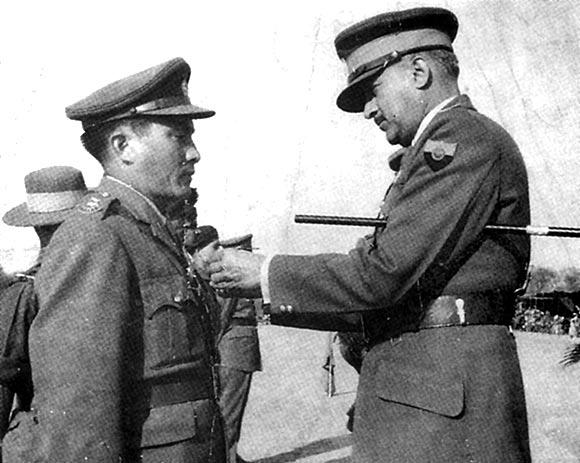
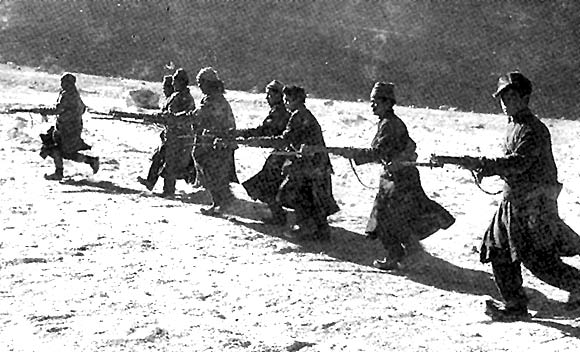
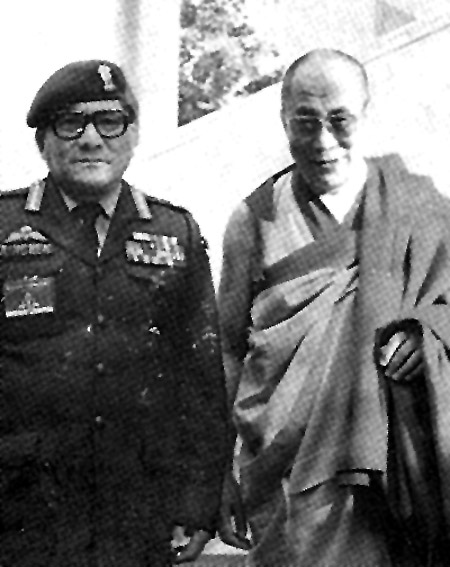
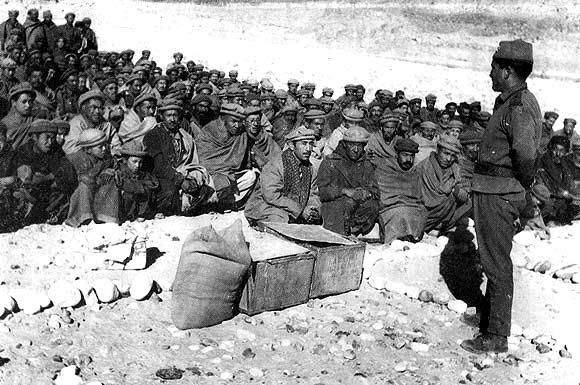
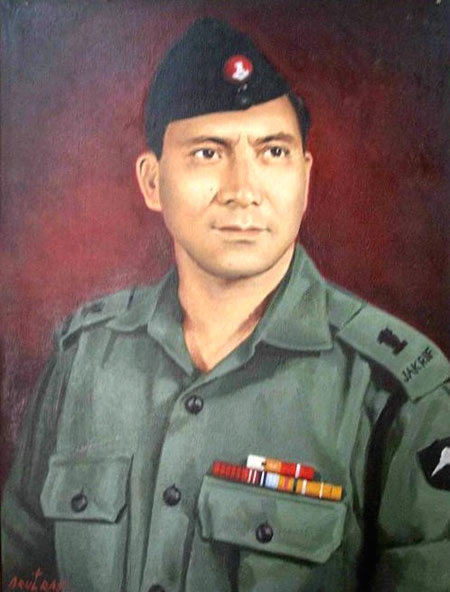

 I wish you the Beauty of nature...
I wish you the Beauty of nature...